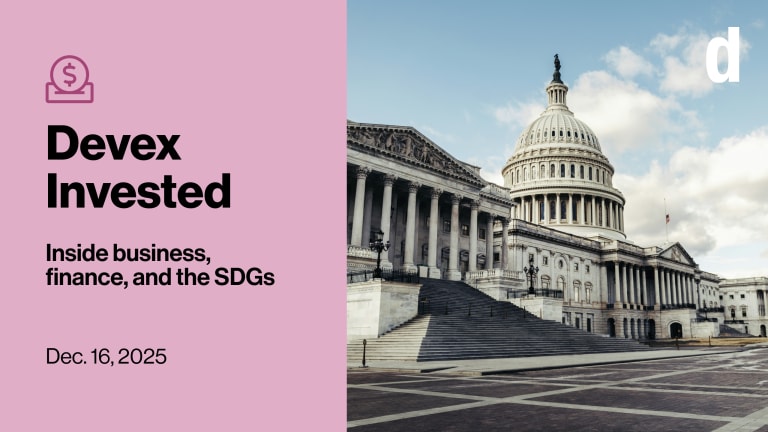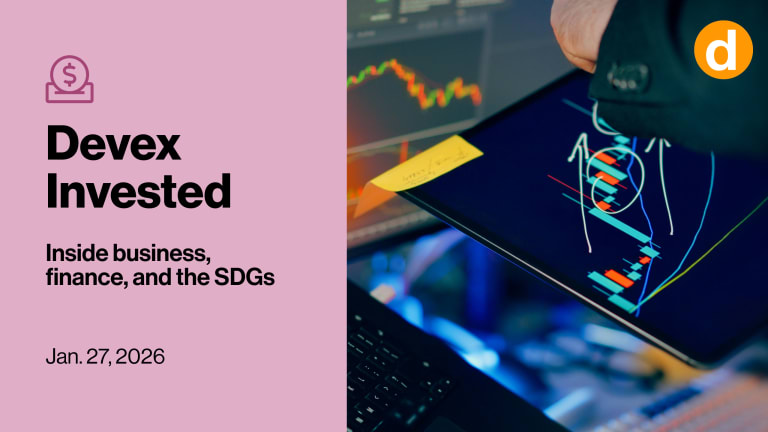
It’s a busy week: I’ve got colleagues in Milan, Italy, covering the Asian Development Bank annual meetings and in Singapore for the Philanthropy Asia Summit. Here in Washington, D.C., we’re still dissecting the budget request President Donald Trump made on Friday.
But first to New York, where the annual United Nations confab to discuss development finance coincided with the Fourth Preparatory Committee meeting ahead of the Financing for Development, or FfD, conference. That once-in-a-decade gathering — happening in Seville, Spain, at the end of June — aims to lay out a plan to finance global development needs and accompanying reforms to the global financial architecture. It comes amid a “turbulent time,” as U.N. Secretary-General António Guterres said last week, adding that “we cannot let our financing for development ambitions get swept away.”
In his speech, Guterres tasked FfD negotiators to take action in three areas:
• Debt.
• Unlocking the full potential of international financial institutions.
• Concrete actions to increase all types of finance, from domestic capital mobilization to private finance and tackling illicit financial flows.
But watchers tell me they wonder about the level of ambition at this year’s FfD and how today’s geopolitics may impact the final negotiated document. We got a hint of what might come with the U.S. looking to weaken the deal by opposing some of the proposed reforms including taxation, credit ratings, and fossil fuel subsidies, according to Reuters. It also wants to remove mentions of climate, gender equality, and sustainability.
There is also an expectation of a strong focus on unlocking private capital, which quite frankly hasn’t worked out so well since the “billions to trillions” slogan was coined at the last FfD conference in Addis Ababa, Ethiopia, in 2015. Those trillions never materialized and, in fact, last year, there was billions less money in investments to emerging markets compared to pre-COVID-19.
Focusing on the private sector is the obvious move, according to Tom Beloe, director of the UNDP Sustainable Finance Hub, both because traditional development funding is shrinking and private capital will be necessary. But those donor dollars have to be “much more catalytic” and more strongly linked to bankable projects with the private sector, he said at an event in Cape Town, South Africa, earlier this year. That means the private sector needs to be part of the discussions in Seville in a way it wasn’t in Addis Ababa.
Don’t expect a specific mobilization target this time around, but a few issues need to be part of getting there: reducing risk by changing domestic policies, developing project pipelines, de-risking transactions, and effectively measuring and delivering on impact.
The “billions to trillions” rhetoric set “unrealistic expectations,” Samantha Attridge, director of the Centre for Private Finance in Development at ODI Global, said at the Cape Town event. “We really need to kind of anchor and rein in our expectation, but there is a prize to go for,” she said, adding that in recent research she found that if the combined investment flows of Europe’s top 35 largest asset owners doubled in five years, that would be about $120 billion annually for those emerging markets and developing economies.
Some things have changed in the past decade, but development finance institutions and multilateral development banks may have to push themselves to think differently. Colin Buckley, managing director at British International Investment, describes their lending as a barbell, where one side does nearly commercial deals to try and crowd in private capital, and at the other end, they use highly concessional capital to invest in the lowest-income markets where few private investors will venture. MDBs and DFIs should do both decisively and make sure they’re factoring in trade-offs on impact and using the right products.
And he points to more ways to mobilize private capital today than there were a decade ago, including things such as portfolio solutions and securitization that people weren’t even thinking about then. And there are some interesting examples of how MDBs are looking to structure the kind of products using their assets that actually appeal to institutional investors; that is, things that are investment grade, liquid, and low-cost.
Background reading: The road to the 2025 financing for development conference
Related opinion: The world must reshape global finance at 2025 UN summit
See also: As US aid falters, development finance trends to watch in 2025 (Pro)
+ Not yet a Devex Pro member? Start your 15-day free trial now to access the event as well as all our expert analyses, insider insights, funding data, and more. Check out all the exclusive content and events available to you.
The skinny on Trump’s budget
The cuts Trump proposed in the “skinny” budget request released on Friday are steep. Only $9.6 billion in new funding for state and international programs — a nearly 84% drop, with the administration banking on rescinding some $20 billion from previous years to cover some additional spending. Even if that rescinded money is used for the 2026 budget, there would still be a roughly 48% cut to spending.
While we learned a lot about cuts, this version of the budget does leave a lot unknown. And it’s important to note that this is a guide for the U.S. Congress, but one they have often ignored in the past. Here are a few line items likely of interest to Invested readers:
• The World Bank’s International Development Association is slated to receive $3.2 billion over three years. Although that’s $800 million less than former President Joe Biden committed to IDA in December of 2024, some worried the U.S. might not have contributed at all.
• Other MDBs don’t look to have fared as well. Here some details are scarce, but funding for the African Development Bank’s African Development Fund, its equivalent to IDA, would get no funding if this budget is adopted.
• The U.S. International Development Finance Corporation appears to be a big winner, with nearly $3 billion more in funding, much of which will go to a new revolving fund that would allow DFC to keep and reinvest returns from its investments. That’s not a new idea, as it’s one that a lot of people have pushed for in the past but had previously been hampered by a “long-standing bureaucratic dispute” that appropriators don’t like funds that aren’t subject to their annual funding, says William Henagan, who previously served as director for international economics on the National Security Council and helped write the DFC reauthorization proposal submitted by the Biden administration to Congress last year. A revolving fund will help create good incentives at DFC, he tells me.
I’ll also note that in its description of DFC in the budget, the Trump administration never mentions the word development. When I asked Henagan about that, he said, “The articulation of DFC as a development instrument is not a productive one,” because the Trump administration doesn’t believe in the concept of development. The question becomes “how to ensure the tools continue even if the language used to describe the purpose is changing.”
Read: Trump budget proposes unprecedented, ‘reckless’ cuts to foreign aid
+ Explore our dedicated page for all the latest news, in-depth analysis, and exclusive insights on how the Trump administration’s policies are reshaping global development.
Uncertain climate
There’s a strange atmosphere at the Asian Development Bank’s 58th annual meeting in Milan, Devex contributor Alessio Perrone reports. There have been very few direct mentions of the Trump administration’s budget cuts, but certainly talk of “uncertainty,” “challenges,” “consternation about the headlines we read every day.” Calls to “stay the course” abounded, even as new ADB President Masato Kanda, who took office in February, has framed the development funding crisis as an opportunity to deepen regional integration.
What else has been fairly ubiquitous? Calls to scale up private-sector development and ADB’s commitment to do so. As demand for development finance grows and public resources stay tight, MDBs — ADB included — have been leaning heavily on the private sector to close the gap.
For ADB, private-sector development is already one of its five strategic operational priorities, and Kanda used his opening remarks yesterday to reaffirm the bank’s commitment to scale it up — not just through direct financing, but by helping countries create business-friendly environments to attract investment.
ADB’s private sector operations continue to expand. By 2030, the bank aims to ramp up annual private-sector financing to $13 billion including mobilized external capital, a fourfold increase from 2022. For context, the bank’s own annual lending totaled some $24 billion in 2024 and is set to increase to $30 billion by 2030.
“More important than financial power is changing the enabling environment for private capital,” Kanda said. He said he would strengthen the dialogue with governments to push reforms including deregulation and privatization.
To that end, ADB and Japan announced a new multidonor trust fund — called the ADB Market Acceleration Platform for Asia and the Pacific, or AMAP — on Sunday to help developing countries in the region promote reforms and attract private sector participation in areas such as infrastructure, clean energy, financial services, and digital transformation.
“AMAP will help promote the business environment by providing policy advice to strengthen regulations and institutions,” Katsunobu Katō, Japan’s minister of finance, said during the event. “It will also enhance ADB’s business outreach activities, so as to bring more technology and knowledge to its development projects.” Japan contributed an initial $20 million to the fund.
Next-gen donors, JET-fueled change
With $4.7 trillion of wealth in Asia, and $2.5 trillion set to transfer to millennials by 2030, the region is poised for a generational shift in giving. Younger philanthropists are showing a sharper focus on climate and environmental issues than previous generations, my colleague Ayenat Mersie reports from the Philanthropy Asia Summit in Singapore, where some 700 people are gathered this week.
Your next job?
Employee Experience Senior Specialist
Development Bank of Latin America and the Caribbean
Colombia | Brazil
The clear message: As global aid pulls back and global challenges continue to mount, Asia’s booming private wealth must step up. Two new Philanthropy Asia Alliance communities launched — one on just energy transition and the other on health — and are designed to help philanthropic groups collaborate more effectively and sharpen their focus on specific issues.
“Despite being home to over half the world’s population and accounting for more than 50% of global energy consumption, Asia receives disproportionately lower philanthropic support for its critical energy transition,” Jamie Choi, CEO of Tara Climate Foundations, said in a statement. Just 20% of philanthropic funding reached Asia, Africa, and Latin America combined between 2019 and 2023, compared to nearly 60% for Europe, Choi added.
Further reading: Philanthropy, blended finance, and the evolving role of NGOs (Pro)
+ Join us tomorrow at 9:30 a.m. ET (3:30 p.m. CET) for an exclusive conversation with Jenna Schornack, managing director at Lever for Change, to gain insights on how to unlock large-scale philanthropic investments. Lever for Change helps donors design and manage large-scale funding competitions and has unlocked millions in philanthropic capital. Save your spot now.
What we’re reading
How to access technical assistance funding from Norfund. [Devex Pro]
Eliminating inefficiencies, unlocking leverage, and maximizing the impact of the EU’s guarantee instrument. [Center for Global Development]
Individual Investor interest in sustainable investing remains strong. [Morgan Stanley survey]
Alessio Perrone and Ayenat Mersie contributed to this edition of Devex Invested.
Search for articles
Most Read
- 1
- 2
- 3
- 4
- 5








